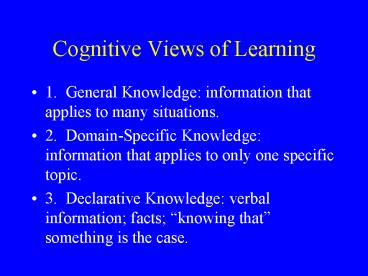Cognitive Views of Learning PowerPoint PPT Presentation
1 / 15
Title: Cognitive Views of Learning
1
Cognitive Views of Learning
- 1. General Knowledge information that applies
to many situations. - 2. Domain-Specific Knowledge information that
applies to only one specific topic. - 3. Declarative Knowledge verbal information
facts knowing that something is the case.
2
- 4. Procedural Knowledge knowing how to
performing a task. - 5. Conditional Knowledge knowing when and why
to use declarative and procedural knowledge. - 6. Artificial Intelligence information
processing view of memory using the computer as a
model for human thinking.
3
- 7. Sensory Memory system of receptors holding
sensory information (1-3 seconds huge capacity). - 8. Perception interpretation of sensory
information. - 9. Gestalt theory that states that people
organize information into coherent wholes.
4
- 10. Bottom-Up Processing perceiving based on
noticing separate defining features and
assembling them into a recognizable pattern. - 11. Top-Down Processing perceiving based on the
context and the patterns you expect to occur in
that situation.
5
- 12. Attention focus on a stimulus.
- 13. Automated Basic Skills the ability to
perform thoroughly learned tasks without much
mental effort. - 14. Short-Term Memory working memory holding a
limited amount of information briefly (5-9 chunks
of information for approximately 20-30 seconds).
6
- 15. Maintenance Rehearsal keeping information
in working memory by repeating it to yourself. - 16. Working Memory the information you are
focusing on at a given moment. - 17. Maintenance Rehearsal
7
- 18. Elaborative Rehearsal keeping information
in working memory/long-term memory by associating
it with something you already know. - 19. Chunking grouping individual bits of data
into meaningful larger units.
8
- 20. Interference process by which remembering
information is hampered by the presence of other
information. - 21. Decay fading of memory with the passage of
time. - 22. Long-Term Memory permanent store of
knowledge (practically unlimited capacity and
duration).
9
- 23. Schemata basic structures for organizing
information and concepts. - 24. Story Grammar typical structure or
organization for a category of stories. - 25. Script expected plan for the sequence of
steps in a common event.
10
- 26. Episodic Memory long-term memory for
information tied to a particular place and time. - 27. Proactive Interference when previous
learning interferes with new learning. - 28. Mnemonics techniques for remembering.
11
- 29. Acronym technique for remembering names,
phrases, or steps by using the first letter of
each word to form a new memorable word. - 30. Mnemonic Device
- 31. Metacognitive Awareness knowledge about
our own thinking processes.
12
- 32. Levels of Processing Theory theory that
states that recall of information is based on how
deeply it is processed. - 33. Serial Position Effect the tendency to
remember the beginning or end (but not the
middle) of a list or collection of information. - 34. Episodic Memory/Long-Term Memory
13
Activity
- Please get into pairs or groups of three and
create an introduction to a lesson plan for
Chapter 7. Your job is to grab the attention of
your class and to teach them an important point
from Chapter 7 in a creative manner. Some issues
you might want to consider - levels of processing theory mnemonic devices
memory elaborative rehearsal story grammar
procedural knowledge serial position effect,
etc.
14
Loci Method
- I need to remember my grocery list.
15
What did I need to get at the store?

